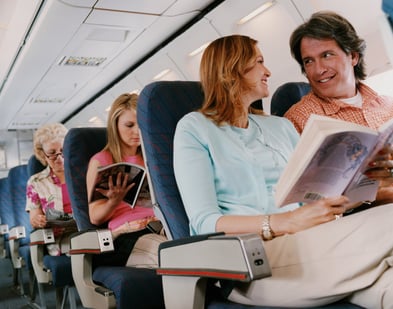 Everyone knows that getting sick is a part of life. Unfortunately, you can get sick at the most inconvenient times. If you're planning a trip, whether for business or for pleasure, the last thing that you need is to get sick while you're away. If you're out of the country, you won't have access to your own physician. Depending on where you're traveling, you may not have access to a high standard of care. The best way to avoid any complications is to keep from getting sick at all. There are several ways that you can keep from getting sick while you travel.
Everyone knows that getting sick is a part of life. Unfortunately, you can get sick at the most inconvenient times. If you're planning a trip, whether for business or for pleasure, the last thing that you need is to get sick while you're away. If you're out of the country, you won't have access to your own physician. Depending on where you're traveling, you may not have access to a high standard of care. The best way to avoid any complications is to keep from getting sick at all. There are several ways that you can keep from getting sick while you travel.
Stay Healthy on the Plane
Due to the fact that you're in very close quarters and that the airplane is pressurized, it's very easy to get sick when you're on the plane. If you catch something on your way to your destination, it can ruin your entire trip. There are a few tips that you should follow to keep from getting sick while on the plane:
-
Wash your hands often or use hand sanitizer
-
Wipe down your tray table with an anti-bacterial wipe before using it. Remnants of E Coli or Salmonella can be left behind from the last passenger.
-
Bring your own pillow and blanket. Unless you're on the first flight of the day, you don't know who used the blanket before you.
-
Avoid the aisle seat. Each person who passes you on the way to the bathroom could potentially get you sick.
-
Keep your air vent open. The air on the airplane is safe and filtered so you should keep the vent open to keep the air around you circulating.
-
If your seatmate is coughing or sniffling, ask if you can move your seat. It takes just one cough or sneeze from your seatmate to get you sick and ruin your trip.
-
Use nasal spray to line your nasal passages. If you increase the activity of the tiny hairs in your nose, it can effectively block germs from entering your body.
Wash Your Hands
Washing your hands to keep from getting sick may sound obvious, but it needs to be mentioned due to its importance. According to the Center For Disease Control (CDC) , washing your hands can essentially save your life. When you wash your hands regularly, it can reduce your chances of food poisoning, flu, diarrhea, vomiting, Norovirus, MRSA, and hepatitis A. When you're traveling, you should wash your hands as often as possible. You should also carry a bottle of hand sanitizer with you and use it often.
Drink Bottled Water
When you're traveling, you cannot be sure if the water supply is safe. Even if the people who live in the country where you're traveling drink the water, it may not be safe for you. The people who live in these areas and drink the water every day will have built up the right bacteria in their stomach to keep from getting sick when they drink the water.
To be on the safe side, you should drink bottled water. Even the ice in different parts of the world might not be safe since many countries don't purify their tap water. Even when you're brushing your teeth, you should use bottled water.
Be Careful of What You Eat
Contaminated food is the most common reason why people get sick when they travel. According to WebMD , traveler's diarrhea, also known as Montezuma's Revenge, is the most common reason that travelers are exposed to the dangerous bacteria, E Coli.
Contaminated food can also result in salmonella, Entamoeba, cholera, and several other potentially harmful illnesses. When ordering food, you should make sure that it's fresh, cooked all the way through, and that it's very hot.
When you're traveling, you may want to enjoy the local customs, such as eating food prepared by street vendors. While this food may be delicious, it''s also the most common cause of disease. If you insist on eating food from a street vendor, stand around and watch before you order your food. Make sure that the person prepping the food wears gloves and that they change them often. They should also wash their hands frequently.
You also want to order from a vendor who has a separate person handling the money as disease is often spread when money changes hands. Finally, look around at the food and make sure that raw food is stored properly. When you're traveling, you don't want a simple meal to ruin your entire trip.
Protect Yourself From the Sun
When you're traveling, the sun can be different than what you're used to at home. In many places around the world, it's much stronger than what you're used to and it can be very dangerous.
It's very important that you use sunscreen that has an SPF of at least 30. A bad sunburn can put a huge damper on your trip. You should also keep your head covered. If you're going to be outdoors for an extended period of time, keep a supply of water with you. This is very important to prevent heatstroke or heat exhaustion. These conditions can hit you without any warning and you can end up in the hospital for days.
Get Vaccinated
If you're traveling out of the country, you may need to be vaccinated. Preventing an illness is much better than getting sick and treating it. If you're not sure if you need to be vaccinated or you don't know what vaccinations are necessary, you can get the information that you need from Orchard Hospital's Medical Specialty Center - Your Everyday Health Care Clinic. If you do need to be vaccinated, the doctors and nurses at Orchard Hospital can provide you with the necessary travel vaccinations.
Protect Yourself From Mosquitoes
Mosquitoes carry a variety of diseases and they can make you sick right in your own backyard. These annoying bugs carry West Nile Virus and encephalitis. When you're traveling out of the country, the mosquitoes carry more serious diseases such as yellow fever, dengue, western equine encephalitis, and even malaria. Even if you don't develop a serious illness from mosquito bites, they can be very itchy and they can make your trip an uncomfortable one. There are a few steps that you should follow to protect yourself from mosquitoes.
-
Use the air conditioning rather than opening the windows.
-
Keep your skin covered with light, loose cotton clothing. This is especially important if you're near a body of water and at twilight or after dark.
-
Cover yourself with 30 to 50 percent DEET spray.
-
If you're sleeping outdoors, sleep under permethrin coated nets and use anti-mosquito candles, plug-in devices, or coils.
It's very important that you know how to protect yourself when you travel. There are plenty of ways that you can get sick and ruin your entire trip. If you'd like to learn more visit the health care clinic at Orchard Hospital.
Our mission at Orchard Hospital is to provide our community with superior healthcare. We strive to ensure that your experience at Orchard Hospital is as pleasant and comfortable as possible. Our priority is to provide you with the care you need when you need it, with skill, compassion, and respect.



